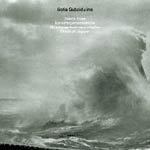
Seven Words / Ten Preludes / De profundis
 $40.00
Out of Stock
$40.00
Out of Stock6+ weeks add to cart
SOFIA GUBAIDULINA
Seven Words / Ten Preludes / De profundis
Elsbeth Moser (bayan) / Manchener Kammerorchester / Christoph Poppen : conductor
[ ECM Records / CD ]
Release Date: Friday 1 March 2002
This item is currently out of stock. It may take 6 or more weeks to obtain from when you place your order as this is a specialist product.
The composer from the Tartar Republic of the former Soviet Union is a unique figure in contemporary music, and the first ECM album of her compositions underlines many of the strengths of her work, foremost among them a deep feeling for sound and texture. As a colourist, too, Gubaidulina has few equals, and the way in which she mixes "folk" and "concert" instruments - in this case the bayan (the Russian button accordion), the violoncello and strings - is exceptional. Tremendous performances by Elsbeth Moser, Boris Pergamenschikow and the Münchener Kammerorchester under Christoph Poppen.
"Insightful performances which surpass all currently available alternatives."
- Gramophone Magazine May 2002
"These three stunning works remain essential listening for anyone seeking to understand the ardent, mystical, unconventional spirit of Sofia Gubaidulina. Moser and Pergamenschikow have not only the technique but also the dedication and insight that this burning music requires, and the ECM recording is superb."
***** Five Stars BBC Music Magazine (May 02)
"A challenging and moving disc, performed magnificently."
- International Record Review (May 2002)
Sofia Gubaidulina was born in Chistopol in the Tatar Soviet Republic in 1931 and grew up in Kazan, at the crossroads, as she once said, of many diverse cultures within the Russian empire. Kazan, an area proportionately rich in craftsmen and artists, was spiritually rich, too. Gubaidulina's own family background embraced Jews and Muslims as well as Christians of Russian Orthodox and Roman Catholic persuasions. One of Gubaidulina's earliest musical memories is of her grandmother chanting Islamic prayers. She has said that she considers herself "a daughter of two worlds, whose soul lives in the music of the East and the West". Her personal commitment to the Russian Orthodox faith has not rendered her unmindful of the insights of other religious perspectives. And as with other major composers from the former Soviet Union - from Arvo Pärt to Galina Ustvolskaya - the religious impulse is closely intertwined in her work with the artistic impulse, and one can hardly be discussed in isolation from the other. "There is no more important reason for composing music", Sofia Gubaidulina has said, "than spiritual renewal."
Neither the spiritual conviction inherent in Gubaidulina's work nor her music's originality won her friends in officialdom: "The reason for Soviet hostility lay in the fact that our whole music revealed the unwelcome phenomenon of freedom, of the inner freedom of the personality. The position of inner independence was simply unacceptable, and wherever that was detected in music it was objected to ..."
It was, however, precisely this independence that Shostakovich had welcomed when he praised Gubaidulaina's student studies at the Moscow Conservatory, saying "I want you to continue along your mistaken path".
Shostakovich, Gubaidulina told journalist Karen Campbell, "encouraged me to be myself, no matter what everybody else said." She counts Shostakovich, alongside Webern and Bach, as a crucial influence on her musical thinking, but she has also been influenced by folk and ritual music of the Caucasus and the Far East and too by her experiences - rare amongst contemporary composers - as an improviser. In 1975 she founded, with Viktor Susslin and Vyacheslav Artyomov the (still intermittently operative) free music ensemble Atreya. As they played, she once said, "sonic imagination became one with our ideas. No longer was there a gap between what we heard and what we imagined; sound and soul had become identical." Gubaidulina's knowledge of the potential of concert and folk instruments - how to make them "breathe", how to draw unorthodox sonorities from them - is rooted in these improvisational sound explorations.
Tracks:
Seven Words
Ten Preludes
De profundis